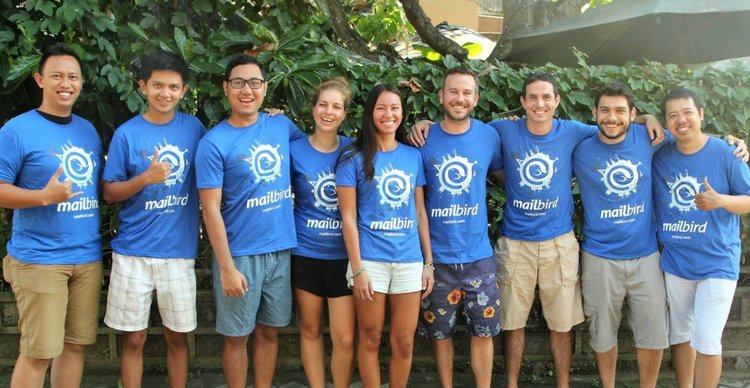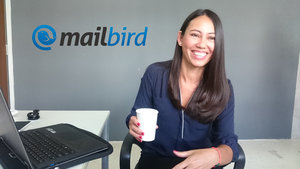Founder Spotlight: Andrea Loubier of Mailbird
Email: A BIG part of our daily life
Admit it, emails might be a huge part of your life. Aside from the irritating spam and promotional stuff, they are something we tend to really look forward to—for information, important communication, and for replies to our queries.
With so many mail sources, clients, subscribers and fans, email management and its related services—communication and productivity apps like Dropbox, Evernote, WhatsApp, Wunderlist, Asana, Todoist, Trello and the like—it’s a jungle out there.
The problem our new company was designed to solve
My co-founders Michael Bodekaer and Michael Olsen and I formed Mailbird in 2011 and launched it publicly in 2012. It’s an email client for Windows OS that unifies online communication with multiple email accounts and productivity apps, and molds it into one beautiful and complete app.
We’re always looking for new app integrations that work well with Mailbird so we can further centralizes online communication in one app. After all, people don’t just use email anymore, we use email plus at least 10 other tools/apps to send and receive information and to get things done.
Soon we’ll be launching for Android in 2018, and I cannot wait.
Inspiration
We got the idea because we saw (and felt for ourselves) the frustrations with existing email tools for Windows. We knew that something better and different could be done from Microsoft Outlook. Sparrow for Mac was a big inspiration for us—it’s a simple, clean, fast and intuitive email client for Mac OS that worked really well with Gmail. Mailbird works with more than just Gmail though, and it has all kinds of great apps to help users do more with their time efficiently and effectively.
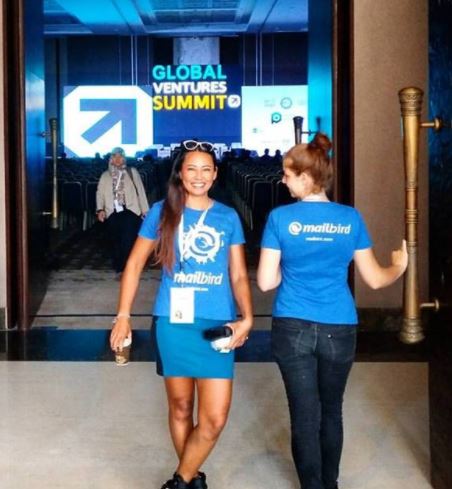
Andrea and Christin representing women in tech and Mailbird at Bali’s Global Venture Sumit in 2017
We started as a consumer product only, then we began seeing small to medium sized businesses switching to us, so now we have a Mailbird for Business option here.
Understanding users and minimizing friction
One of the first major hurdles we faced was understanding the most active users and minimizing the friction (i.e. hassle) of switching from one email client. I was also building a global company, and so I had significant work to do in terms of localized marketing outreach in regions where English wasn’t a commonly used language.
We launched Mailbird in Bali, Indonesia, which has a large international expat community with different languages, marketing channels, and cultures. Within a few weeks, we learned that doing a successful, localized geographic launch would require at least one month of preparation work. We needed to build a significant presence in that geographic market to build buzz and prime some traction for the localized launch. We learned the importance of hiring a local marketing team in specific regions to help with cultural nuances and appropriate marketing channels.
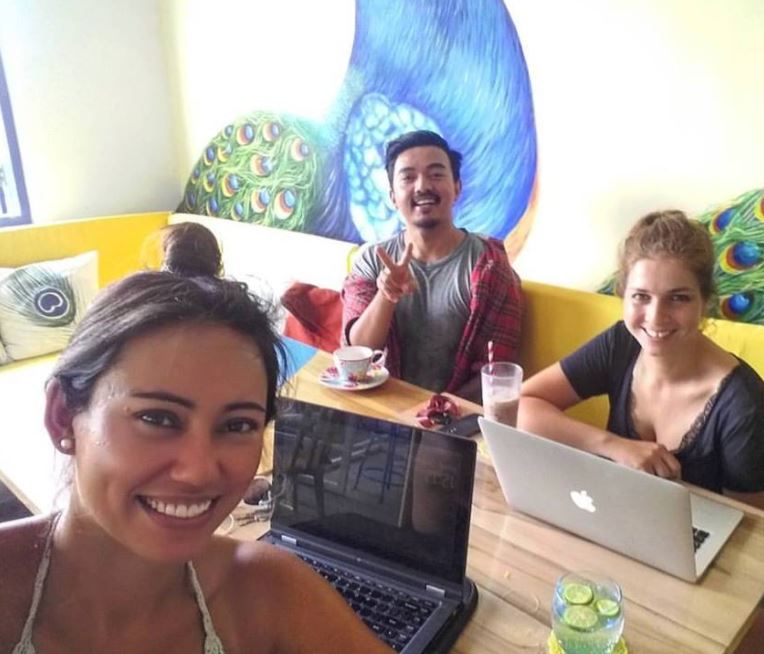
How to build a great remote team
Building a remote, distributed team is both challenging and opportunistic. First, you need to start with hiring the right people. By opening up your talent pool outside of a 10-mile radius, you end up with access to some of the most brilliant minds that are a perfect fit for your company, people that you may not have otherwise hired had you limited your talent pool to location.
I give each team member I decide to hire a three-month probationary period to evaluate their self-discipline and self-motivation for getting work done and contributing to our bigger vision and hitting development milestones. They have to be quick to learn, adapt, and be flexible with time, considering all the international time zones we work with.
The tools: We use and love Time Doctor for time tracking and management. We use Asana for task and project management and meetings. Skype for team while and sub-team chats. Mailbird, of course, is our core tool for email both internal and external.
Finally the most important thing is cultural fit. This brings me back to the three-month probationary period. Not only is it to evaluate the dedication, responsibility and quality of work a team member can deliver, but also the willingness to learn and grow within their roles. All of our team members are unique, smart, adaptive individuals, and despite us all having many different interests, there is still a sense of like-mindedness. One for sure is we are all very worldly and love travel; it’s part of the reason why we are working with a technology that is used globally.
Building and working with a remote team is incredible, and despite not being in the same place working all year round, we have the freedom to work from anywhere in the world and we occasionally will meet up with each other in different locations. The freedom and inspiring locations do wonders for our team, and we still are small enough that we can meet once a week on a live call, in nine different time zones!
The mistakes I made, and what they taught me
Throughout the journey there have been failures and struggles, but through failure one gains experience and ultimately becomes better at growing and managing one’s business. I cannot stress this enough when speaking to a community of women who are currently pursuing entrepreneurship or who are already deep into their startup journey.
The failures included poor research for a localized geographic launch, not knowing how to pitch the business to investors, not understanding cash flow or cap tables, hiring the wrong people, outsourcing work.
So, we just leveled up to do better in all facets of the business. The failures are always critical for developing the business, they teach you how to do better and how to succeed. Case in point: now I know how to do good research for a localized launch. I know how to pitch my business to investors. I understand cash flow and cap tables. I hire the right people. I only outsource the work I should outsource. Since our initial stumbles, the Mailbird team has discovered more ways to succeed through many iterations of Mailbird as a highly productive software for the entire world to take advantage of.
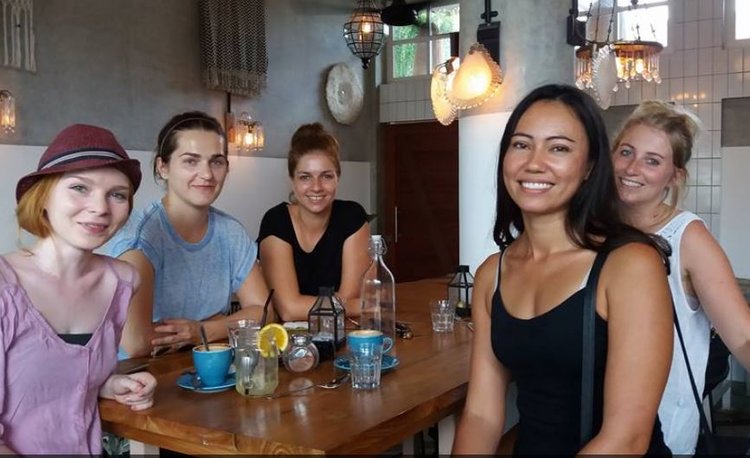
Lavinia (administrative), Natalia (HR & Recruiting), Christin (marketing), Betina (legal) and Andrea (CEO) having a meeting to catch up on quarterly milestones in 2017
Millennials: The best generation for women
As a millennial female founder of an award-winning email tech startup, I’ve taken on many challenging roles during the entire Mailbird startup journey. As many CEO’s will share, you wear many different hats. You do marketing, you are the public figure representing the company. I’ve been a part of the HR department, I’ve been in a team and acted as a project manager, the grammar checker, the motivator, the glue, the PR specialist, the speaker, the feedback giver, the problem solver, the growth hacker, the UX designer, the negotiator, the sales person, the customer happiness director.
I’ve done quality assurance and control, convincing everyone that the impossible is possible. I’ve been the biggest cheerleader for our team, customers, and business. You wear many hats, but you never have a dull day.
In the end, my main role is to support the awesome people behind Mailbird. As a woman and CEO of a fast growing tech company, I am dedicated to the success of our business. For Mailbird, I set milestones and goals for future visionary developments for email communication and productivity.
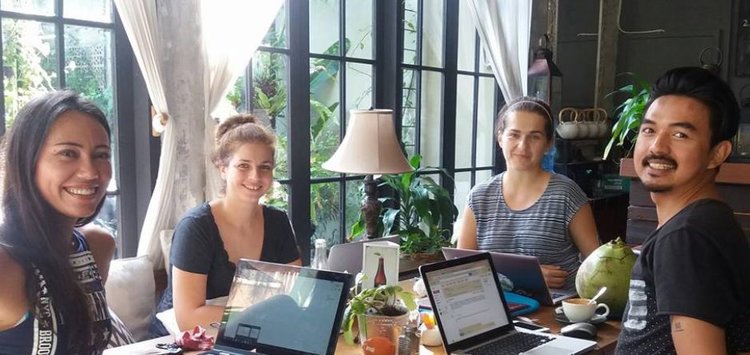
Working in another cafe in Bali.
I hope that my level of commitment to Mailbird’s development and growth as a team and innovative solution can inspire and resonate with other women. I will relentlessly work towards success and mass recognition for Mailbird, and we’re already off to a good start. I believe that persistence, character and mindset are what empower women to do great things and I hope that I’ve set as an example of this for others.
I myself am a big advocate for women in executive or lead roles, especially in pursuing occupations in technology. I didn’t come from an information technology background. For Mailbird, there is a lot of pressure of going up against the email giants, but I didn’t let that stop us. I learned and developed my confidence in growing Mailbird from the ground up.
From 2017 and onwards to 2018, it’s an incredible time for more women to jump into tech and hold the reins within the business world. I hope that my story with Mailbird can be an example of the possibilities for women that want to build a great business from the ground up, be their own boss, set their own rules, learn how to build confidence and continue the cycle of success of female entrepreneurship all over the world.
About the Author
Andrea Loubier is the CEO and co-founder of Mailbird, a company with a team of 14, which is spread all over the world, from Indonesia to Zurich, Japan, Copenhagen, Germany, Brazil, Ukraine, USA, and Canada. Before Mailbird, she worked for a software company and as a project manager at a market research firm. Andrea is also a contributor for Forbes. She’s been featured with her company Mailbird in BBC, CNBC, CNN, TechCrunch, Lifehacker, The Verge, PC World, IT World and won startup of the day by Microsoft’s Bizspark startup program.
